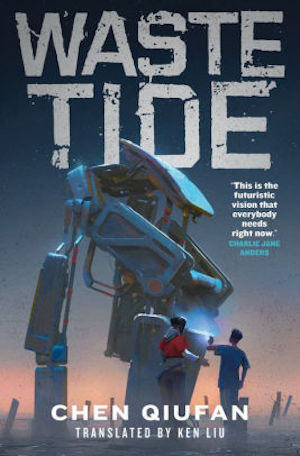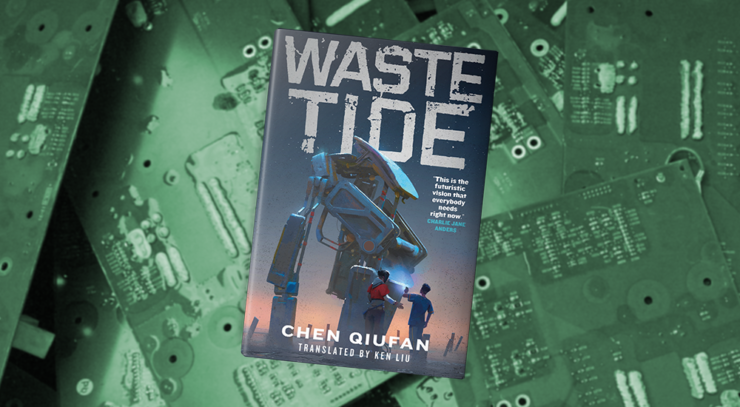Chen Qiufan is a Chinese science-fiction author whose works have won a number of awards. His short fiction has appeared in translation in Clarkesworld and Lightspeed, among other publications. His first novel, The Waste Tide, was published in China in 2013. As Waste Tide, it’s now been translated into English by Ken Liu, whose translation of Cixin Liu’s The Three-Body Problem won the 2015 Hugo Award for Best Novel, and whose fiction has won awards in its own right.
Chen grew up near Guiyu, a place in China that’s now home to the world’s largest e-waste recycling centre. Waste Tide sets itself in a location that appears to have strong influences from reality: in a near-future world, “Silicon Isle” receives electronic waste from all over the world. Three local clans—lineage associations that on Silicon Isle operate a little bit like the mob—control the e-waste business and profit from it, while migrant workers from other, more impoverished parts of China travel to Silicon Isle to do the dangerous, toxic work of actually picking over and recycling the waste. Silicon Isle is deeply polluted and the migrant workers are exposed to high levels of noxious chemicals and to a great deal of violence: they’re seen as disposable.
American Scott Brandle has come to Silicon Isle ostensibly to promote an American company’s green, environmentally-friendly, profitable (too-good-to-be-true) deal for development in Silicon Isle, but he has other secrets and other goals. His translator, Chen Kaizong—a local boy whose family moved to America when he was young—is having feelings about being “home”; he wants to belong, and he wants to change it for the better. Mimi is a migrant worker who gets caught up in the personal politics of Silicon Isle’s elite families and also contracts a virus that allows her to do things with tech—while giving her a second, different personality. Conflict between the migrant workers and the elites breaks out when Mimi is tortured almost to death. Meanwhile, Scott learns that his secret mission—to retrieve a mistakenly-disposed-of prosthetic—is part of a terrible history going all the way back to WWII. And for him, Mimi holds the key. Things come to a head in the teeth of a typhoon, and while some things change, others remain the same.
I confess I don’t read a lot of fiction in translation. In the past, most of the SFF-in-translation I’ve read has been translated from French or from Japanese. Perhaps the cultural gap and my lack of familiarity with the tropes and commonplaces of Chinese fiction explains why I found Waste Tide at times baffling in its narrative decisions—and at times extremely distasteful.
Chen is deeply interested in environmental consequences and in social conditions, in the tension between tradition and change and in the humanity of the exploited. Liu’s translation is fluent and graceful (with the exception of some paragraphs of geekery that must have read just as awkwardly in the original), offering further nuance and explanation in a handful of unobtrusive footnotes. The prose is both readable and enjoyable, even if I didn’t always feel as though I were able to follow the narrative.
Buy the Book


Waste Tide
This is not a book that passes the Bechdel test in any meaningful fashion. I’m not sure what’s going on with Mimi, but she seems more like a cipher than a human being most of the time, and the more power she has to affect things, the more helpless she seems to be as herself—it’s not her that has the power, but something within her, something using her. She seems at times to be something of a McGuffin, more symbol than character.
I could be biased on this point. I’m not inclined to be generous to a novel that has graphically depicted a female character’s torture and violation in sexual terms, or one that has used the death of a sister (again depicted graphically) as motivation for a male character’s life choices, and the death of a daughter as explanation for another’s trauma and emotional deficits. Or a book that concludes by giving its only major female character brain damage that reduces her to the capacities of a child. There are multiple distinct and distinctive male characters in Waste Tide. The same isn’t true for women.
A number of Waste Tide’s choices don’t sit right with me. There’s some good stuff in here, but the treatment of female characters makes it impossible for me to enjoy the novel as a whole.
Waste Tide is available from Tor Books.
Read an excerpt here.
Liz Bourke is a cranky queer person who reads books. She holds a Ph.D in Classics from Trinity College, Dublin. Her first book, Sleeping With Monsters, a collection of reviews and criticism, was published in 2017 by Aqueduct Press. It was a finalist for the 2018 Locus Awards and was nominated for a 2018 Hugo Award in Best Related Work. Find her at her blog, where she’s been known to talk about even more books thanks to her Patreon supporters. Or find her at her Twitter. She supports the work of the Irish Refugee Council, the Transgender Equality Network Ireland, and the Abortion Rights Campaign.










